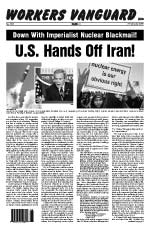
The “N” Word: “To This Day, I Wish I’d Never Said the Word” A Salute to Richard Pryor Richard Pryor was so funny he could make you laugh at a funeral on Sunday Christmas day, as his character Mudbone said. He made you laugh so hard you felt like you broke something, and in a broken society crazed with race- and sex-hate, laughter and the pain of being black in America went together. “I wanted to be just like him,” Damon Wayans said a few years ago, “except for the drug habit and the failed marriages and the temper and the guns.” Debilitated by multiple sclerosis, which was diagnosed in 1986, Pryor died of a heart attack on December 10 at the age of 65. He was in 40 movies and co-wrote, with Mel Brooks, Blazing Saddles (which the studio wouldn’t let him appear in). But his main legacy is his stand-up work, captured in such classics (available on DVD) as Richard Pryor—Live in Concert (1979), Live on the Sunset Strip (1982) and Here and Now (1983). If you’ve never watched him, you’re missing a major piece of 20th-century American culture. Pryor wasn’t merely a comedic genius but a piercing social observer and critic. In his 1995 autobiography, Pryor Convictions, Pryor (as Mudbone) remarks that “the truth is gonna be funny, but it’s gonna scare folks.” There was nothing he wouldn’t talk about on stage, including his upbringing in his family’s brothels and bars in Peoria, Illinois. He inspired several generations of comedians, black and white. He started off as a mainstream storyteller in the Bill Cosby mold. As Pryor recalled, “I made a lot of money being Bill Cosby, but I was hiding my personality.” In 1967, Pryor stormed off stage at the Aladdin Hotel in Las Vegas, shouting, “What am I doing here? I’m not going to do this anymore!” As he wrote in Pryor Convictions, at around that same time, “I read and re-read a copy of Malcolm X’s collected speeches. I put Marvin Gaye’s song ‘What’s Going On?’ on my stereo and played it so often it became the soundtrack to my life.” Pryor took a brief hiatus in 1970 and re-emerged with the hard-hitting humor that became his trademark. The cover to his album Is It Something I Said? showed Pryor about to be lynched. He told audiences that he used to be a “Negro” but had given it up because there was “no room for advancement.” Pryor won broad popular appeal with his biting routines, which included regular use of the “N” word, along with every obscenity in the book. Among the many reasons to honor Richard Pryor is his later public repudiation of the “N” word as utterly demeaning and wounding to black people. Citing the current prevalent embrace of the word among black hip-hop artists and intellectuals, we wrote in “The ‘N’ Word in Racist America” (WV No. 807, 1 August 2003): “Far from being a protest against racial oppression, as some leftist black intellectuals would have it, the pervasive use of the ‘N’ word is a result of the racist rulers’ denigration of black people. This is a form of ‘defiance’ born of demoralization and despair, a product of the ever-worsening conditions of black life and the absence of any significant social struggle in the decades since the collapse of the civil rights movement.” Richard Pryor rejected the use of this hurtful and deadly racist epithet a quarter century ago. He made a trip to Africa in 1979, escaping the poisonous American atmosphere saturated with race-hatred long enough to take a clear look at it. He told about his experience in Live on the Sunset Strip: “There’s nothing like going and seeing nothing but black. Black people. I mean from the wino to the president, it’s black people…. One thing I got out of it was magic. I’d like to share it with you. I was leaving, and I was sitting in the hotel and a voice said to me, it said, ‘Look around, what do you see?’ And I said, ‘I see all colors of people doing everything, you know.’ And the voice said, ‘Do you see any “I was sitting there, I said, ‘Yeah, I been here three weeks and I haven’t even said it. I haven’t even thought it.’ And it made me think, Oh my God, I’ve been wrong. I’ve been wrong.” Pryor continued: “I ain’t never going to call another black man a n----r. You know, because we never was no n----rs. That’s a word that’s used to describe our own wretchedness. And we perpetuate it now. Because it’s dead. That word is dead. [We’re] men and women.” Pryor said in conclusion: “And I don’t want them hip white people coming up to me, calling me no n----r or telling me n----r jokes. I don’t like it. I’m just telling you, it’s uncomfortable to me. I don’t like it when black people say it to me…. So I love you all, and you can take that with you.”
|
|
||||||||||||||||||||||||||||||||||||||||||||||||||||||
